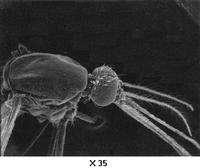Researchers Discover How Mosquitoes Use Blood to Reproduce

A University of California, Riverside research team has uncovered how a female mosquito’s first blood meal triggers its reproductive system to produce eggs, a finding which could lead someday to new ways of controlling disease-spreading mosquito populations.
The team, led by Professor of Entomology Alexander S. Raikhel, authored a paper titled GATA Factor Translation is the Final Downstream Step in Amino Acid/TOR-Mediated Vitellogenin Gene Expression in the Anautogenous Mosquito Aedes Aegypti. The paper, co-authored with UCR researchers, Immo Hansen, Jong-Hwa Park and Geoffrey M. Attardo, currently a postdoctoral fellow at Yale University. The paper is published in today’s edition of the Journal of Biological Chemistry.
The paper shows how a newly discovered signaling pathway, using amino acids formed after the female mosquito feeds on blood, triggers a chain reaction that produces eggs. Researchers had previously thought that a neurological pathway was the only means by which the mosquito Aedis aegypti signaled its ovaries to produce eggs. The paper identifies the final step in this chain reaction, a genetic factor known as the GATA factor that activates the gene vitellogenin, which produces yolk protein. This, in turn, signals the ovaries to produce eggs.
Key to this newly discovered process is the term translation, which refers to the transformation of RNA into proteins, which in turn trigger genes to do certain things.
“What we’re looking at is a process that releases the brakes on a hold in the egg development of the mosquito,” Raikhel said.
The impact of the current paper, according to Raikhel, is it’s identification of the biological roles of the pathway in the mosquito’s development to “release the brakes,” on the egg-production mechanism.
In mosquitoes, the genes that signal production of yolk proteins remain inactive until the insect takes its first blood meal. In the summer of 2004, Raikhel authored a paper that appeared in the journal Proceedings of the National Academy of Sciences titled Target of Rapamycin-Mediated Amino Acid Signaling in Mosquito Autogeny, which identified the chain reaction.
The subsequent and frequent blood meals required to keep the process going are what makes the mosquito such a formidable vector of such deadly diseases as malaria, dengue fever, yellow fever and the west Nile virus.
“If we could find a way to block this pathway, we could close the gate on the mosquito’s reproduction or find ways to make the mosquito a less effective disease vector,” Raikhel said.
“The next step in our research should be identifying which amino acids are produced and used by the mosquito and how they work on its system,” he added.
Source: University of California, Riverside
















